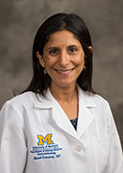Rachel Pauls Food is a proud supporter of FODMAP research. Accordingly, we are thrilled to announce the first recipients of the Rachel Pauls Food FODMAP Research Travel Grants: the University of Michigan’s Shanti Eswaran, M.D., and Kenya Jackson, research coordinator. The grants will be utilized to present their FODMAP-related research abstracts at the annual Digestive Diseases Conference this May in Chicago.
Dr. Eswaran, a clinical assistant professor with the University of Michigan’s Division of Gastroenterology, will present research titled, “Serum 7C4 levels decrease after low FODMAP diet in IBS patients: a potential mechanism for benefit.” The research explores the specific reasons the low-FODMAP diet leads to symptom improvement.

Dr. Eswaran explained the importance of the travel grant as follows: “IBS is a prevalent condition that leads to considerable morbidity and disability, but treatment options are limited. As a consequence, providers and IBS patients are increasingly turning to dietary solutions to treat their symptoms. We have and are continuing to create the evidence which will allow providers to administer the low-FODMAP diet to IBS patients in the most medically responsible way. At the same time, we intend to generate hypotheses that will drive the evolution and simplification of the low-FODMAP diet.”
She added: “Disseminating our work and learning of our colleagues’ endeavors worldwide is an exciting and necessary part of this mission. The funds from the Rachel Pauls Food travel grant will allow me to travel to our national meeting to share our results and collaborate with others in the field.”
Ms. Jackson’s research assesses the association of anxiety and depression with symptom improvement with a low-FODMAP diet. Her study is titled, “The low FODMAP diet is equally efficacious in IBS-D patients with and without baseline anxiety: A post-hoc analysis from a U.S. randomized, controlled trial.” She is the GI research coordinator.

Congratulations again to the grant recipients, and we look forward to our continuing support of the excellent FODMAP research at the University of Michigan.








